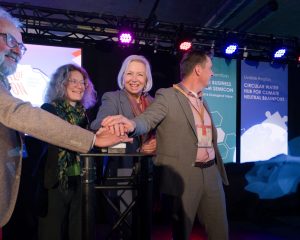Accelerate by working together
At the height of the corona pandemic, we used no less than 4.2 million disposable isolation gowns per week in the Netherlands. During a ‘normal’ week in healthcare, an average of 770,000 isolation gowns end up in the trash after one use.
During the first lockdown, the great dependence on production from East Asia soon became clear, especially when it comes to protective clothing for healthcare. With a great shortage of masks, gloves and isolation gowns, among other things, the national consortium had to search for the right materials. Not an easy task, because the origin and degree of protection of many protective materials was unclear.
In order to be better prepared for crisis situations in the future, it is important to tackle this problem at its core: a long-term solution so that we will not be surprised again.
With the strong sustainability ambitions that our government has set for 2030, an economic and circular solution is needed. In order to not miss out again, security of supply and production closer to home is the goal.
Fast innovation through collaboration
Fast innovation and joining the right forces have therefore been the starting points for Eindhoven Engine, TNO, Eindhoven University of Technology and HAVEP in taking up the challenge of developing economically and circularly sustainable medical isolation gowns. In this so-called Triple Helix collaboration, the business community, government and education and research institutions join forces to innovate quickly. The strength of this successful collaboration lies in the openness and transparency between the parties and the short communication lines that they have with each other. The parties also work side by side and constantly learn from each other, which makes them equal in this collaboration. Bringing together the market, researchers and a concrete demand from healthcare and government provides a realistic picture of what the end result should look like. In this case: a sustainable isolation gown for healthcare which can be worn at least 50 times and recycled after its end-of-life.
Entering the second phase
The parties involved have now successfully completed the first phase of their innovative collaboration on behalf of the government and the report of the feasibility study has been submitted. At the beginning of June, it will be announced which parties are allowed to continue their research in phase two of this government tender based on the SBIR (Small Business Innovation Research) scheme. In this second phase, the feasibility of the product will be further tested and various cases will be trialed on the market.

